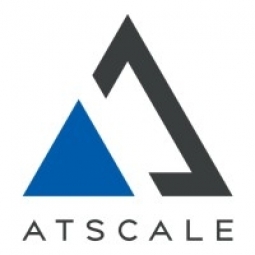公司规模
Large Corporate
地区
- America
国家
- United States
产品
- AtScale
- Snowflake
- Excel
- Tableau
技术栈
- Self-Service BI
- Analytics Modernization
- Cloud Migration
实施规模
- Enterprise-wide Deployment
影响指标
- Productivity Improvements
- Digital Expertise
- Customer Satisfaction
技术
- 分析与建模 - 实时分析
- 平台即服务 (PaaS) - 数据管理平台
适用行业
- 金融与保险
适用功能
- 商业运营
- 销售与市场营销
用例
- 实时定位系统 (RTLS)
- 质量预测分析
服务
- 数据科学服务
- 系统集成
关于客户
Affinity Federal Credit Union (AFCU) is a large member-owned credit union that is in the top 2% of credit unions by asset size. The credit union prides itself on the ability to leverage newer technologies before much larger banks. AFCU is continually looking for opportunities to better leverage their data assets to improve service to their more than 185,000 members. They have a forward-looking data team that is always on the lookout for analytics governance options to enable broader self-service reporting across the organization.
挑战
Affinity Federal Credit Union (AFCU), a large member-owned credit union, was looking for opportunities to better leverage their data assets to improve service to their more than 185,000 members. They had been relying on legacy analytics infrastructure tools like ModelMax or Dundas BI, which required too much manual effort and slowed down decision-making. AFCU had been partnered with a Credit Union Service Organization (CUSO) that provided analytics-as-a-service, but this approach was slow and uncontrollable, often getting in the way of decision making and making it difficult to grow internal understanding of data. AFCU realized they couldn’t remain reliant on an outsourced analytics team and legacy processes to unearth insights from their data. It was time to transition to a modern, self-service BI program to allow faster, data-backed decision-making at scale.
解决方案
AFCU saw the importance of a semantic layer to establish analytics governance policies while establishing the level of flexibility needed to scale self-service BI. A semantic layer would allow for unified data access across all stakeholders in their business, technical and otherwise. AtScale was chosen as an independent semantic layer that enabled open connection to different BI platforms and different cloud services. This approach expanded access to data for both seasoned data scientists and to non-technical business users. By expanding data science programs, AFCU was able to incorporate advanced prescriptive and predictive analytics to their business, powering growth and smart decision-making. Building out the right semantic layer strategy was important to enabling outcome-based decision-making and gaining leverage from a treasure trove of customer and financial data. The AFCU team was able to leverage a flexible modeling environment to build views of raw data that addressed a wider range of business needs. The ability to quickly create new views of data, without relying on complex ETL, enabled the team to more rapidly iterate analytics.
运营影响

Case Study missing?
Start adding your own!
Register with your work email and create a new case study profile for your business.
相关案例.

Case Study
Real-time In-vehicle Monitoring
The telematic solution provides this vital premium-adjusting information. The solution also helps detect and deter vehicle or trailer theft – as soon as a theft occurs, monitoring personnel can alert the appropriate authorities, providing an exact location.“With more and more insurance companies and major fleet operators interested in monitoring driver behaviour on the grounds of road safety, efficient logistics and costs, the market for this type of device and associated e-business services is growing rapidly within Italy and the rest of Europe,” says Franco.“The insurance companies are especially interested in the pay-per-use and pay-as-you-drive applications while other organisations employ the technology for road user charging.”“One million vehicles in Italy currently carry such devices and forecasts indicate that the European market will increase tenfold by 2014.However, for our technology to work effectively, we needed a highly reliable wireless data network to carry the information between the vehicles and monitoring stations.”

Case Study
Safety First with Folksam
The competitiveness of the car insurance market is driving UBI growth as a means for insurance companies to differentiate their customer propositions as well as improving operational efficiency. An insurance model - usage-based insurance ("UBI") - offers possibilities for insurers to do more efficient market segmentation and accurate risk assessment and pricing. Insurers require an IoT solution for the purpose of data collection and performance analysis

Case Study
Smooth Transition to Energy Savings
The building was equipped with four end-of-life Trane water cooled chillers, located in the basement. Johnson Controls installed four York water cooled centrifugal chillers with unit mounted variable speed drives and a total installed cooling capacity of 6,8 MW. Each chiller has a capacity of 1,6 MW (variable to 1.9MW depending upon condenser water temperatures). Johnson Controls needed to design the equipment in such way that it would fit the dimensional constraints of the existing plant area and plant access route but also the specific performance requirements of the client. Morgan Stanley required the chiller plant to match the building load profile, turn down to match the low load requirement when needed and provide an improvement in the Energy Efficiency Ratio across the entire operating range. Other requirements were a reduction in the chiller noise level to improve the working environment in the plant room and a wide operating envelope coupled with intelligent controls to allow possible variation in both flow rate and temperature. The latter was needed to leverage increased capacity from a reduced number of machines during the different installation phases and allow future enhancement to a variable primary flow system.

Case Study
Automated Pallet Labeling Solution for SPR Packaging
SPR Packaging, an American supplier of packaging solutions, was in search of an automated pallet labeling solution that could meet their immediate and future needs. They aimed to equip their lines with automatic printer applicators, but also required a solution that could interface with their accounting software. The challenge was to find a system that could read a 2D code on pallets at the stretch wrapper, track the pallet, and flag any pallets with unread barcodes for inspection. The pallets could be single or double stacked, and the system needed to be able to differentiate between the two. SPR Packaging sought a system integrator with extensive experience in advanced printing and tracking solutions to provide a complete traceability system.

Case Study
Transforming insurance pricing while improving driver safety
The Internet of Things (IoT) is revolutionizing the car insurance industry on a scale not seen since the introduction of the car itself. For decades, premiums have been calculated using proxy-based risk assessment models and historical data. Today, a growing number of innovative companies such as Quebec-based Industrielle Alliance are moving to usage-based insurance (UBI) models, driven by the advancement of telematics technologies and smart tracking devices.
Case Study
Enhancing Security and Compliance in Remitly's Global Money Transfer Service with Fastly
Remitly, an online remittance service, was faced with the challenge of securing its proprietary global transfer network. The company needed a security solution that could meet PCI requirements and protect customers' sensitive transactions through its mobile application. The solution had to be capable of defending against new and emerging attack types without impacting performance. Remitly also had to deal with irregular traffic patterns, such as a sudden spike in account transfers from a small network segment on the Pacific coastline of South America. The company needed to determine in real time whether such traffic indicated an attack or valid requests. A traditional web application firewall (WAF) would not be able to distinguish this traffic, potentially leading to customer frustration if the IP was blacklisted.







